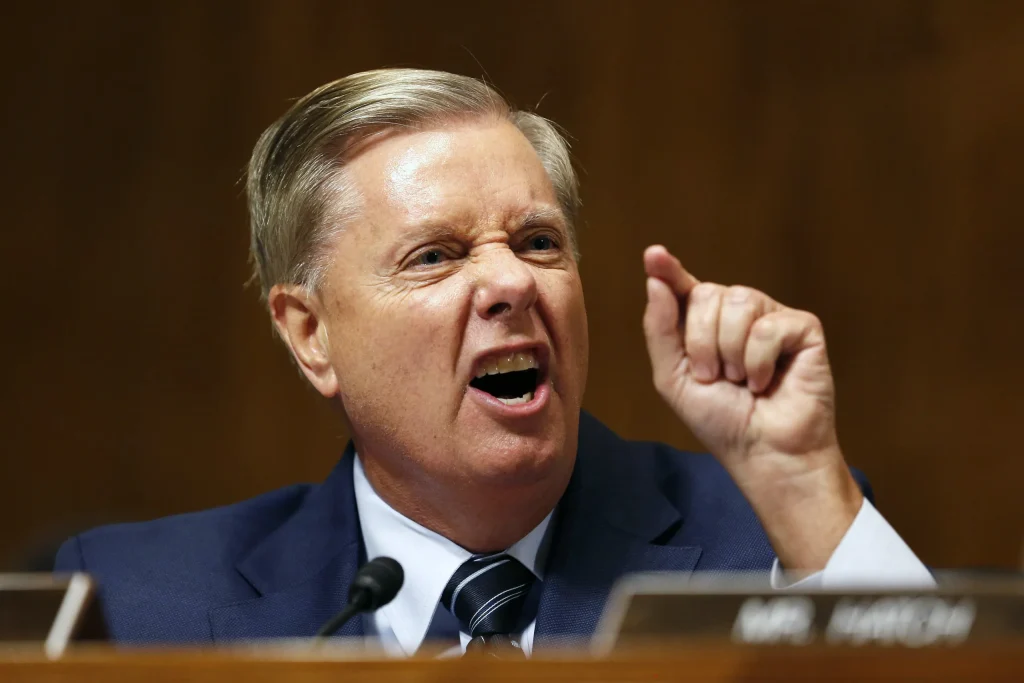By Agency Report
United States of America has voiced against the Palestinian push to expel Israel from the United Nations, calling it a “political theatre.”
In a statement on his verified Twitter account, Senator Lindsey Graham emphasized that Israel’s survival is at risk on multiple fronts, including political and security threats.
Graham’s remarks come as tensions between Israel and Palestine continue to escalate on the international stage.
The Palestinian Authority has sought to garner support for removing Israel from the UN, an effort Graham dismisses as symbolic but potentially damaging.
Related news
- We’re ready for cease-fire talks with Israel – Hezbollah
- Israel vows retaliation as Iran’s missiles hit its territories
- Our leader Hassan Nasrallah was killed in an Israeli airstrike – Hezbollah
“I realize that this effort by the Palestinians to expel Israel from the UN is political theater,” Graham wrote. He underlined, however, that such actions could have serious implications for Israel’s future.
Graham, a long-time supporter of Israel, made it clear that the U.S. would not tolerate such a move. “Simply put: if Israel is expelled, it will be the end of the United States’ support for the UN,” he warned. The senator’s message signals a potential shift in U.S.-UN relations, should the global body take steps to expel the Jewish state.
The South Carolina senator US concluded his statement with a powerful assertion: “If Israel goes, so goes America.”
His comments reflect the deep political and strategic alliance between the U.S. and Israel, reinforcing that any attempt to undermine Israel’s position on the global stage would lead to a significant backlash from Washington.
No room for peace or negotiation –Iran
The Iranian military has announced a significant escalation in its ongoing conflict with Israel, raising alarms about the potential for increased violence in the region.
Posted on its verified Twitter account, the statement unequivocally stated, “There is no room for peace or negotiation anymore; either we will achieve victory or another Karbala will occur.” This stark warning marks a dramatic shift in rhetoric, emphasizing a complete rejection of diplomatic avenues.
According to Times Of Israel, The invocation of the historic Battle of Karbala—a pivotal event in Shia Islam symbolizing martyrdom and resistance—underscores the Iranian military’s framing of the conflict as a religious struggle. By drawing this parallel, Iran elevates the stakes, positioning its fight against Israel not merely as a political issue but as a profound ideological battle.
The statement also honored Yahya Sinwar, the recently killed Hamas leader, referring to him as the “Great Commander of Islam.”
Sinwar, a key figure in orchestrating numerous attacks against Israel, including the deadly events of October 7, was seen as a martyr by many in Iran. His death has sparked outrage among Iranian officials, who have long championed Hamas and other anti-Israel factions.
The military’s message reflects an unwavering commitment to its broader ambitions in the region, indicating that Sinwar’s death will not deter their objectives. Instead, it portrays the ongoing conflict as a critical fight for victory, suggesting that failure could result in catastrophic consequences reminiscent of Karbala, a revered symbol of resistance against oppression.
As tensions escalate, this declaration from Iran not only signals a hardening stance but also raises concerns about the potential for further violence and instability in an already volatile region.
The implications of this rhetoric could reverberate throughout the Middle East, with significant consequences for regional security and diplomatic efforts.
Russia cautions against Iran’s attack
Russia has issued a stark warning to Israel, cautioning against any potential military strikes on Iran’s nuclear facilities.
The warning, delivered by Russia’s Foreign Ministry, highlights concerns over the catastrophic consequences such an action could have, both for regional stability and global nuclear safety.
According to a report by Al Jazeera, Russian Deputy Foreign Minister Sergey Ryabkov stressed the gravity of even considering an attack on Iran’s nuclear infrastructure, emphasizing the risks it would pose to nuclear safety.
His comments reflect Russia’s position as a key player in international efforts to maintain stability and prevent the proliferation of nuclear conflicts in the region. This warning comes amid heightened tensions between Israel and Iran.
He said, “We have repeatedly warned and continue to warn, to caution [Israel] against even hypothetically considering the possibility of a strike on nuclear facilities and nuclear infrastructure [of Iran]. A catastrophic development and a complete negation of those postulates in the area of ensuring nuclear safety that exist.”
The warning coincides with ongoing discussions within Israeli leadership on how to respond to a recent missile attack by Iran. Israel, facing mounting security concerns, has reportedly been evaluating a range of possible retaliatory actions, including military strikes on Iran’s nuclear sites.
However, Russia’s public caution highlights the potential global ramifications of such a move, stressing the need for restraint.
Moscow has consistently advocated for nuclear non-proliferation and has positioned itself as a key defender of international nuclear safety standards. Any disruption in the region, particularly involving nuclear infrastructure, could have far-reaching consequences beyond the immediate conflict.
Russia’s warning also highlights its commitment to maintaining the status quo in the Middle East, where it has established itself as an influential actor. The caution against attacking Iran’s nuclear facilities signals Moscow’s desire to prevent further destabilization in a region already grappling with multiple conflicts. The potential for a military confrontation between Israel and Iran would complicate Russia’s broader efforts to maintain influence and order in the area.
As tensions between Israel and Iran continue to simmer, regional powers are carefully weighing their next moves. Russia’s insistence on restraint and adherence to nuclear safety norms underscores the fragile balance that exists in the Middle East, where any aggressive action could have severe, far-reaching consequences.

